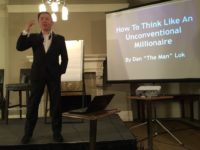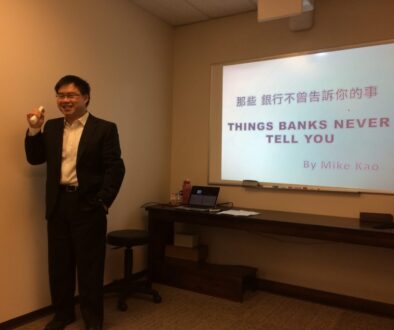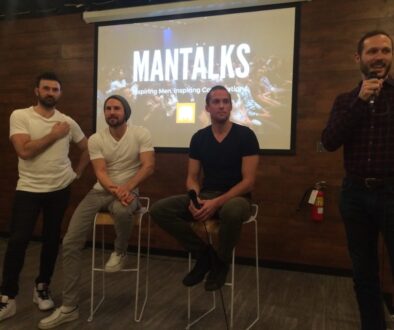How to think like an unconventional millionaire
Date: February 10, 2016
Name: How to think like an unconventional millionaire
Presenter: Dan Lok
To create maximum wealth, mindset is the key element for successful entrepreneurs. Skills can only reach a limit, but success philosophies, beliefs, and thinking will go beyond the limitation. Vancouver Entrepreneurs Group invites Dan Lok, the serial entrepreneur, will reveal the ultimate truth for entrepreneurs to reach the millionaire level. Dan Lok will cover the system behind the millionaire thinking and the hidden secret of the definition of money. In this presentation, entrepreneurs will transform their beliefs; moreover, entrepreneurs will learn how to manage their business in a more powerful way.
Dan Lok is the Founder of Vancouver Entrepreneurs Group. Many entrepreneurs consider him as the “Millionaire Mentor” in the internet marketing world. Lok had launched many successful internet companies and written many bestselling books. With his guidance and leadership, Lok helps many young entrepreneurs to lead their success in the right direction. Furthermore, Lok is a keynote speaker that motivates many entrepreneurs in this generation.
Dan Lok strongly believes the way entrepreneurs think can change their beliefs in business. Lok will share his personal philosophies and business practices that help him achieve extraordinary entrepreneurial and financial success. Therefore, Lok will reveal the harsh reality of business mindset.
Within 100 people, if entrepreneurs follow them for 40 years, they will discover only 1 will be wealthy, 4 will be financial secure, 5 will continue working, 36 will be deceased, and rest will be broke. Based on statistic, 5% will be successful and 95% will be unsuccessful. This means in order to be successful, entrepreneurs should do the opposite of what other people are doing.
Lok believes success is ultimately and fundamentally about behavior, and not about attitude, education, skill, and even luck. When entrepreneurs behave incongruent with their goals, they will have difficulty achieving them.
There are too many entrepreneurs focus on the management of their business instead of themselves. Therefore, Lok shares the top 4 common inner conflicts that hold them back from improvement.
Conflict #1: Negative association with money and wealth
When entrepreneurs associate negative thoughts about money, the universe will not attract money to them. Lok reveals the top 10 money limiting beliefs.
| If I am successful people will hate me |
| If I make a million dollars, I might lose it |
| There is not enough money to go around |
| If I have a little more than I need to get by, somebody else would have to go without |
| If I have a lot more than I need to get by, a lot of people will have to go without |
| It is better to take less than to be responsible for someone else’s hardship |
| Democrats punish the rich |
| Republicans punish the poor |
| If I make a lot of money, I will be betraying my father who never made much money |
The main reason why people associate these money limiting beliefs is to be a good person in front of the society. These beliefs come from 95% of the people. To become successful, entrepreneurs need to do the opposite to become the remaining 5%.
Money limiting beliefs are considered to be defensive statement. Defensive statement is build when people have no clue how to get money. How do entrepreneurs know they are on the right track? If entrepreneurs are successful, people will hate them.
Conflict #2: Overly sensitive to others’ opinions and perceptions, criticism, and gossip, outright attacks
When people attack with their opinions, usually they are afraid because they are witnessing things that are not aligned with their beliefs. Then, entrepreneurs will give in and lost focus. Successful entrepreneurs will not take others’ negative opinion and influence their beliefs. When beliefs are strong, nothing can change their direction.
Conflict #3: Fear of changes required or caused by higher level of success
When people acquire success, they will discover they are facing many unfamiliar emotional obstacles. When the belief of “not good enough” appears in their mind, they will stop thrive for more success. The fear of change will make entrepreneurs question their beliefs.
Conflict #4: Realization of unwillingness to pay the price, but equally dominant unwillingness to admit it
Success has a price and entrepreneurs need to pay in advance. When entrepreneurs receive success, they know they pay enough. Many entrepreneurs are not willing to pay for the price. That is the difference between average and successful entrepreneurs. Lok mentions there is never a right age to achieve success. Mentor can make entrepreneurs do the tasks that they do not want to do so they can become what they want to be.
Lok believes low 6-figures earners can operate with relatively high levels of unresolved inner conflicts about money and wealth. Therefore, millionaires have no margin for these weaknesses.
“Money is the amplifier of who you are”
Lok wants entrepreneurs to remember the 3 levels of earning money
- Make it
- Keep it
- Multiple it
Many entrepreneurs can make the money, but successful entrepreneurs will have strategy to keep it in business, and millionaire will have the strategy to multiple it with investment.
Lok shares the 15 millionaire mindset wealth principle that will shift entrepreneurs’ beliefs and thinking.
Principle #1: Think abundance, not scarcity
Many people do not know how to handle large amount of money. Based on statistic, people who won the jackpot will go bankrupt within 3 years. The reason is because they do not know how to make the money. When people buy lotto tickets, they are sending the message of “relying on luck” or “hoping to win” to their sub-conscious mind. Subsequently, they are adapting that belief in their lives.
Millionaires do not put “luck” in their sub-conscious mind. Lok believes when people believe wealth is limited, they will view it as a zero-sum game. When people believe each dollar they make comes from other people’s expense or other people’s loss, the universe will keep their power of wealth attraction low.
Instead of putting bills on the fridge or in the drawers like everyone else, Lok suggests entrepreneurs to put cash. They will reframe their mindset with money instead of payable. This will help entrepreneurs to obtain wealth triggers. Entrepreneurs should pay their bills immediately and put it away. They should only spend 5 minutes on it; otherwise, they will keep on thinking about it.
“Whatever you think on, expands”
It is important to adapt good and positive into the mind. Entrepreneurs should take as much as they can, so the universe will make more for them.
“Your wealth is addition for you, but subtraction for no one else”
Principle #2: Think needs, not money
When people chase money, they usually will not receive it. This statement illustrates the way people thinking can influence the result. Lok emphasizes if entrepreneurs want to donate and make a difference, they should make more money so they can donate more.
Elon Musk’s first wife, Justine Musk, mentions in order to be successful, entrepreneurs need to find innovative ways from fusing two different worlds.
Lok defines the law of attraction as people become who they think and their conscious and unconscious thoughts will make their reality. However, thinking alone will never make anyone rich unless that thinking manifests itself. Consistent action is the key for entrepreneurs.
Scale creates millionaire. Magnitude creates millionaire. Therefore, scale and magnitude create billionaire. Making money is easy if entrepreneurs know scale and magnitude, but keeping and multiplying are difficult.
“If you want to be billionaire, you need to impact billion people”
Instead of believing the law of attraction, entrepreneurs should believe in the law of effection. The more lives entrepreneurs affect in an entity they control, in scale or magnitude the richer they will become.
Principle #3: Think process, not event
Many people do not realize the method behind successful entrepreneurs’ success. Millionaires are forged by process, and not by event. All self-millionaire create their wealth by carefully orchestrated process. To obtain wealth, entrepreneurs need to learn successful entrepreneurs’ process. Process makes millionaire and events are by-product of process.
Lok believes when entrepreneurs try to skip the process, they will never experience the events. When they try to skip the process, they will usually make bad investment.
Mentor is important. Mentors can help entrepreneurs to correct their practice of business. Entrepreneurs will go nowhere if they keep doing incorrect practice. When entrepreneurs are doing the same thing over and over, they will not improve until someone corrects them.
So what holds people back from getting a mentor? The answer is pride.
Principle #4: Think simultaneous, not sequential
In early childhood, people are conditioned to learn progress in strict linear fashion from sequential steps. Business has no steps; instead, entrepreneurs can learn from the progress. However, most entrepreneurs are trapped by a limiting belief that everything should have a local order.
Millionaires know that is not how things are done. They take massive action and juggle things simultaneously.
There is no law of sequential. Lok indicates what entrepreneurs want to do is drag the future toward them in the present and not waiting to catch up to it at some distant time and place.
When entrepreneurs feel overwhelm with business activities, Lok recommends entrepreneurs to make overwhelm their friend.
“Overwhelm can help you grow. Aim for process, not perfection”
Principle #5: Think environment, not will power
Willpower can be highly overrated. Entrepreneurs must realize they are a product of their environment. It is important to choose the right environment that will best develop them towards their objectives. When entrepreneurs analyze their environment, they should be aware what things are helping them toward success or holding them back from success.
The people entrepreneurs hang with the most and the books they read will determine their next 5 years of success.
“Rich people have big library and poor people have big TV”
Lok shares some of his wealth triggers in his office environment.
| Clock | Time is valuable |
| Art of War statue | Think strategically |
| Horse | High energy |
| Family Protrait | Family value |
| Books | Author, think and write |
| Name blocks | Personal brand |
Lok wants entrepreneurs to remember that if they do not alter the environment, there will be no implementation. Nothing gets done without a deadline and entrepreneurs should not start something new until they finish the current.
Principle #6: Think accomplishments, not activities
When people are busy, it does not mean they have accomplished a lot. Entrepreneurs should stop being “I gotta” person. Results are all that matters. Lok defines productivity as the use of time, talent, energy, and resources in a manner calculated to move people progressively closer to worthwhile goals.
“Priorities should govern schedule, and schedule should not govern priorities”
Money loves clarity, money loves speed, and money loves circulating. Therefore, most entrepreneurs are producing 90% of their wealth from only 10% of their time. With a slight adjustment in time, wealth can change significantly.
Lok always question himself with these two questions every day in business.
- Are we making money today?
- How can we make more money?
Few entrepreneurs will take the time to analyze or study their current customers or accounts for contribution to net profit; Moreover, only few entrepreneurs will analyze their activities and time usage the same way.
“Making splash in water does not mean you are swimming”
Many people like to multitask. Lok thinks multitask is not productive in business. Multitask is waste of energy. Successful entrepreneurs will focus their energy to complete one task and continue to the next.
Principle #7: Think assets, not income
The skill of leverage is extremely important for entrepreneurs. Entrepreneurs who are earning less than 6-figures receive their all income from work. Anyone above mid 6-figures has some portion of income from leverage. To achieve 7-figures, entrepreneurs will need to leverage 25 to 30% of their work. Moreover, to sustain 7-figures, entrepreneurs need to leverage 60% of their work.
Robert Kiyosaki mentions rich people acquire assets and the poor middle class require liabilities that they think are assets. In this generation, there are only few entrepreneurs get to sustain their millionaire status purely through work. Lok suggests entrepreneurs to own income-producing assets.
The biggest income-producing asset any entrepreneurs can have is their name brand. Usually, entrepreneurs can also obtain these 3 kinds of assets.
- Other people’s money (OPM)
- Other people’s resource (OPR)
- Other people’s connection (OPC)
Principle #8: Think global, not local
It is important for entrepreneurs to think international. They should always think about how they can serve a bigger market place. Many entrepreneurs will only focus on their industry’s news. They never suspect all industries are linked in the same economy.
Lok recommends entrepreneurs to travel to obtain different perspective from different countries.
Principle #9: Think investment, not expense
Many people refuse to invest themselves because of “worth”. They do not believe they will receive the value. Instead, entrepreneurs should think about Return on Investment (ROI). Successful entrepreneurs will not think how much it costs, yet they will think how much it can make them. Rich people will tie the negation first then worry about money later.
Principle #10: Think resourceful, not resources
Entrepreneurs should always think how they can use the resource instead of just acquiring the resource. Most people will wait for things to come along, such as the right time or right resources). There is no such thing as the right time. People will also wait for other factors, such as permission or experience. Most of the time, people will lose the opportunity.
Lok defines resourcefulness as to drive by a constant desire and process of self-help and information gathering. When unexpected events happen, people will think, “There is nothing I can do”; however, unconventional millionaire will think, “There is always something I can do”. This is resourceful thinking.
Principle #11: Think collaboration, not isolation
In this generation, entrepreneurs, who go solo, will have lower chance to be successful. In business, entrepreneurs should always ask these two questions.
- Who is backing me up?
- Who is my network?
Entrepreneurs should always aim for the win without a fight. They must know who they can work with. Entrepreneurs should hang around with people who are more successful than them.
“I teach you everything you know, but I did not teach you everything I know”
Principle #12: Think pragmatic, not idealistic
Entrepreneurs need to remember the Murphy’s Law. In business, whatever can go wrong, it will go wrong. It will go wrong at the worst possible time. It will go wrong on the worst component, and it will all be remembered as entrepreneurs’ fault.
When a negative situation happens, entrepreneurs can treat it as the opportunity of preparation. There are 3 types of people.
- People who make things happen
- People who watch things happen
- People who wonder what happened
Lok believes there is a forth type of people, which is people who anticipate what may happen and act before it does. Millionaires have the aggressive and anticipatory attitude to response to threats.
Things can go wrong in business. Entrepreneurs should always remember to think before and have a backup plan.
Principle #13: Think big, not small
Lok wants entrepreneurs to think about this important question.
- What is your legacy you want to leave?
Death is something everyone terrifies. Entrepreneurs should always have the sense of urgency. Life is short and time is precious. Therefore, entrepreneurs should always think about the big picture. If they think big, they can change the way they operate.
Lok suggests entrepreneurs to write their goals every morning with present tense. This will help remind entrepreneurs their directions.
“Big goals? It is ok, I have my whole life working on it”
Principle #14: Think fast, not slow
Fast is the new big. Because of internet, people can access knowledge almost anywhere. In business, it is not how much entrepreneurs know, it is how fast they can implement.
“Fast fish eats slow fish, not big fish east small fish anymore”
Principle #15: Think innovation, not invention
The major difference between innovation and invention is to take something exist and make it better.
Lok defines innovation is creating new value and capturing value in a new way. Innovation is something new to business that fills an untapped customer need. In Hollywood, there is little money made from true creativity, but a whole lot of money is made from putting old wine in a new bottle.
For unconventional millionaires, innovation actually means innovative transfer of proven methods or strategies from outside their field into their field.
Lok wants to give entrepreneurs a statement of advice.
“The universe does not give a damn about you”
Whatever is holding entrepreneurs back, it is not a big deal. Everyone will keep getting older and everyone will eventually die in the future. Everything people experience will only last for a brief moment in universe. Therefore, entrepreneurs should stop wondering what it all means, and how they can do and what other people think. Entrepreneurs’ objective is just go out and do something epic.





